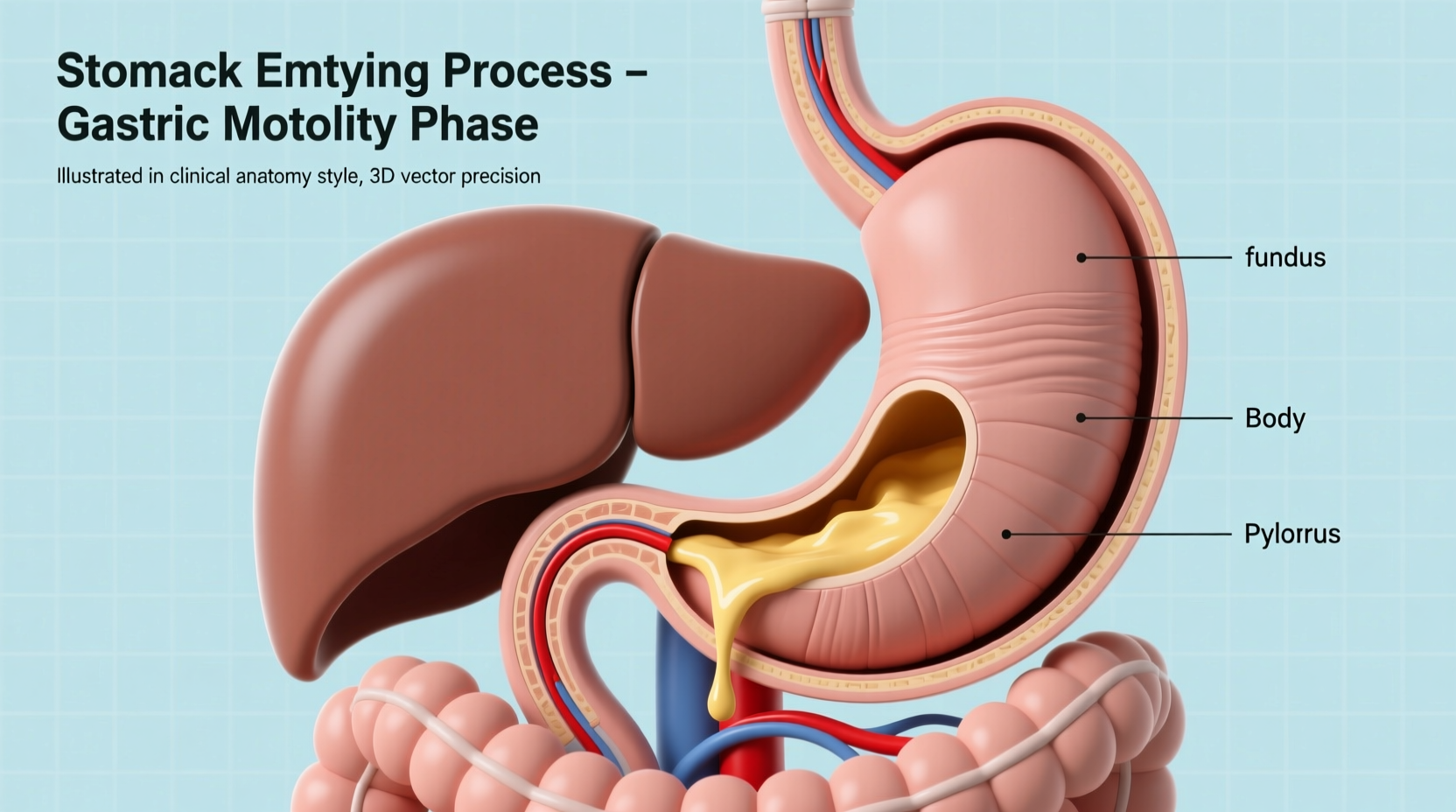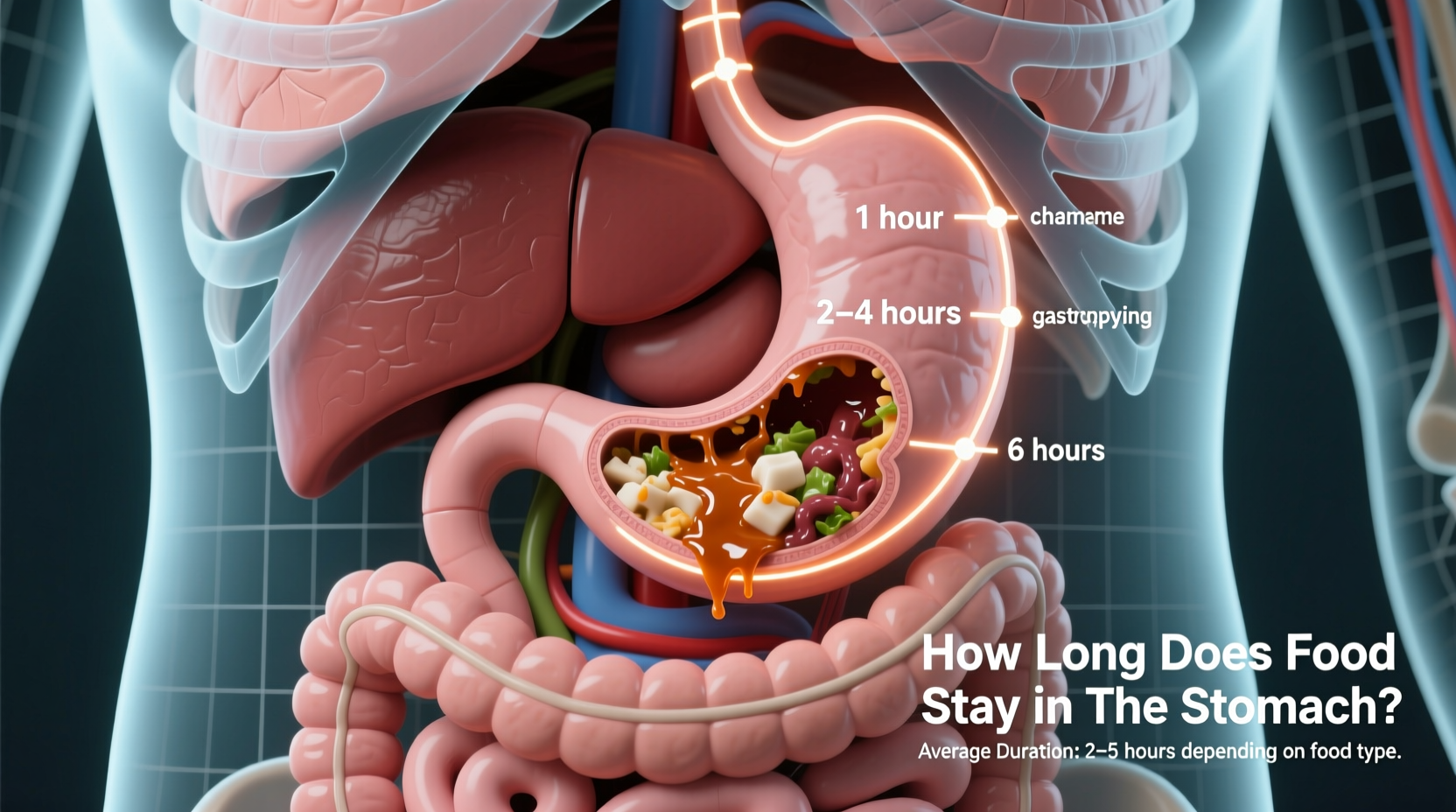Understanding how long food stays in your stomach isn't just academic—it directly impacts your energy levels, hunger cues, and digestive comfort throughout the day. Whether you're timing pre-workout meals, managing digestive issues, or simply curious about your body's processes, knowing these digestion timelines helps you make smarter food choices.
The Digestion Clock: What Happens in Your Stomach
Your stomach isn't just a passive storage container. It actively churns food with digestive enzymes and hydrochloric acid, transforming your meal into a semi-liquid mixture called chyme before gradually releasing it into the small intestine. This controlled release ensures optimal nutrient absorption downstream.
According to research published in the American Journal of Physiology—Gastrointestinal and Liver Physiology, the stomach's emptying rate follows a predictable pattern: rapid initial emptying of liquids, followed by a regulated release of solids based on nutrient composition. This sophisticated system prevents your small intestine from being overwhelmed by undigested material.

How Different Foods Exit Your Stomach
Not all foods leave your stomach at the same pace. The macronutrient composition of your meal creates dramatically different emptying timelines. Here's what clinical studies reveal about common food categories:
| Food Type | Average Emptying Time | Key Influencing Factors |
|---|---|---|
| Water & Clear Liquids | 10-20 minutes | Temperature, volume consumed |
| Carbohydrate-Rich Foods | 1.5-3 hours | Fiber content, sugar concentration |
| Protein-Based Meals | 2-4 hours | Protein type, accompanying fats |
| Fat-Heavy Dishes | 4-6+ hours | Fat quantity, meal volume |
| Mixed Nutrient Meals | 3-5 hours | Macronutrient balance, fiber content |
This variation occurs because your digestive system prioritizes nutrient extraction. Fats trigger hormonal signals that slow gastric emptying to allow proper emulsification, while carbohydrates move through more quickly. A 2023 study from the Mayo Clinic Digestive Diseases Research Center confirmed that meals containing 30g or more of fat can double emptying time compared to low-fat alternatives.
Why Your Personal Digestion Timeline Might Differ
While the averages provide a useful framework, your actual stomach emptying time depends on several individual factors:
Physiological Variables
Age significantly impacts digestion speed—studies from the National Institute on Aging show gastric emptying slows by approximately 15% between ages 30 and 70. Gender also plays a role, with research in Neurogastroenterology & Motility indicating women typically experience 20-30% slower gastric emptying than men, particularly during certain menstrual cycle phases.
Health Conditions That Alter Digestion
Certain medical conditions dramatically affect stomach emptying. Gastroparesis, which affects an estimated 4 million Americans according to the American Diabetes Association, can extend stomach retention to 12+ hours. Conversely, conditions like hyperthyroidism may accelerate emptying to under 2 hours for some foods.
Lifestyle Influences
Your daily habits reshape digestion patterns. A Johns Hopkins University study demonstrated that moderate exercise within 30 minutes of eating can speed gastric emptying by 25%, while high-stress levels measured by cortisol markers slowed emptying by 40% in test subjects. Even your posture matters—sitting upright after meals improves emptying rates by 18% compared to reclining, per research published in the Journal of Neurogastroenterology and Motility.
Practical Applications for Daily Life
Understanding these digestion timelines helps you optimize several aspects of daily living:
Strategic Meal Timing
For sustained energy, pair slower-digesting proteins with moderate carbohydrates. A pre-workout meal should contain primarily carbohydrates 1-2 hours beforehand, while high-protein dinners promote overnight satiety. If taking medications, consult your pharmacist about optimal timing relative to meals—many drugs require an empty stomach for proper absorption.
Managing Digestive Discomfort
Experiencing bloating after meals? Try reducing fat content in your largest meal. Those with acid reflux often benefit from finishing dinner 3+ hours before lying down. If you consistently feel overly full hours after eating, consider keeping a food diary to identify problematic items—common culprits include fried foods, excessive dairy, and large portions of high-fiber vegetables.
When to Consult a Professional
While occasional digestive variations are normal, persistent symptoms warrant medical attention. Consult a healthcare provider if you regularly experience:
- Nausea or vomiting more than 2 hours after eating
- Unintended weight loss with normal eating patterns
- Feeling full after just a few bites of food
- Consistent bloating lasting 4+ hours post-meal
Optimizing Your Digestive Health
Simple dietary adjustments can improve your digestion timeline without drastic changes. The American Gastroenterological Association recommends:
- Chewing thoroughly to reduce stomach workload
- Consuming liquids between meals rather than with food
- Starting meals with protein to moderate carbohydrate absorption
- Incorporating ginger or peppermint (in moderation) to support gastric motility
Remember that digestion is highly individual—what works for others may not suit your physiology. Pay attention to your body's signals and adjust accordingly. For personalized guidance, registered dietitians can help develop eating patterns aligned with your unique digestive rhythm.











 浙公网安备
33010002000092号
浙公网安备
33010002000092号 浙B2-20120091-4
浙B2-20120091-4